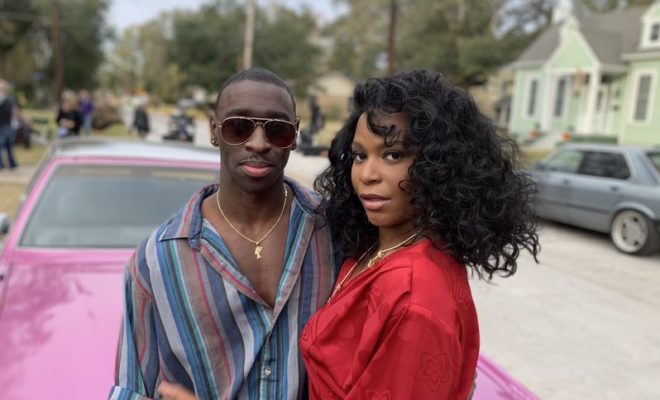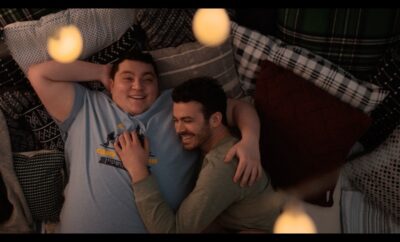
Interviews
Alexandra Grey – Gossamer Folds
By: Lisa Steinberg
Q) Gossamer Folds is such a moving film and the character you portray is simply breathtaking. What gravitated you towards the role of Gossamer who has such a wealth of heart in her?
A) I think it was the fact that she reminded me in so many ways of myself growing up a young trans woman and how I yearned for just a different life, one that would be freeing to me and one that would be just so much different. She grew up in this small town and I spent the last two years of my teenage life living in a small town in Chicago. Just so much of the character really reminded me of my upbringing. So, I really wanted to tell that story.
Q) Gossamer has this confidence and resolve, but also this underlying tenderness at the same time too. What does Gossamer learn through her budding friendship with Tate and vice versa?
A) I think that they learn a lot from each other. I think in this life you meet people whether for a season or a for a lifetime and I think that in this particular story these two needed to meet. Tate (Jackson Robert Scott) was going through something in his private life with his family and dealing with his father and mother, and we are both coming from two different worlds but realizing that we are not that dissimilar. A lot of the things that we go through as human beings are so similar that we can be there. I think he teaches me in so many ways. I think he is the big reason that she has to leave. She has to go. She has to chase her happiness and I think that is in part to her meeting this young boy who comes in and fills her heart and shows her that she can live in a world where love exists no matter who she is. I think that for him, she is in his life as well for that same reason. When he needed a friend the most, he found it in this person that was so different that is probably now going to make him think about life in a completely different way, a more progressive and loving and honorable way.
Q) You and Jackson have such an innate pure connection that played so generously and touchingly charismatically off of one another. How did you and Jackson really end up being drawn together through working on this project?
A) We met before we did a screen test together. We met down in Louisiana and we got to hang out and go to New Orleans and spend the day together and just got to hang out. The first time we met in person we were already best friends. I think that him being so young and energetic and such a little star, that energy just transferred onto me. It just made me want to meet him with that same positive energy all of the time. It’s the innocence, I think. For me, that just made me want to never take one day for granted. I think we connected right away.
Q) The relationship between Tate and Gossamer really focuses on how bonds through blood aren’t always what determines what makes a family. Talk about how Gossamer and Tate really solidify their own form of family at the end of the film.
A) I think that being a member of the LGBT community, I think that family is definitely what you make it. It’s not about blood. It’s not about any of that. I think it’s about who makes you feel happy and loves you no matter what. Sometimes unfortunately that’s just not the people who birthed you. So, I think we definitely experience that a little bit in this film. My mother obviously loved me in the movie, but she passed away and I think my father loves me but he doesn’t know how to love me in a way that is honorable to me. I think that in Gossamer leaving, I think that’s her way of saying you are my family, but this is not my chosen family. When she goes to New York, I imagine that she will find her chosen family, one that makes her feel good about herself. Tate was her family. He made her feel happy. Did he know that she was trans? No, but it didn’t matter. I don’t think it would have mattered either way. I think when we are talking about chosen family, it’s about what makes you feel happy and who supports you and loves you no matter what.
Q) The relationship Gossamer has with her father sort of mirrors Tate’s relationship in a way with his own where we see that hate is learned, but also through education, listening, and learning what is ingrained doesn’t always have to reside within us. Talk about how that is also a really big signifier that we see as well throughout the film.
A) I think that with her dad, I have had it in my own personal life where one person in particular, my auntie, I remember when I first made the transition she was not on board. I remember we had a really big blow up and I ended up moving out. She just wasn’t accepting at all. Later she called me out of the blue and she said I am getting married, and I couldn’t imagine you not being there. From that moment we have had the perfect relationship. She said, “Oh my gosh, you’re so beautiful!”
I think it just doesn’t matter. It is just about learning at the end of the day that life is too short and everyone is different and why spend that time being upset or judging someone when you can love someone even if you don’t agree with their lifestyle or their decisions. I think that no matter what at any age we can always educate people. That’s why I think the movie is so important in itself, it’s for everybody. It’s not just for trans folk and it’s not just for straight people. It’s for older people, it’s for younger people, it’s for everyone. Because if you even look at me differently based on the fact that I am trans, if you even turn your nose up for whatever the reason is, if it’s I don’t understand that then you are part of the problem. Everybody is different and you wouldn’t look at a homeless person like you’re disgusting. You would look at somebody who is a stripper and say, “Oh my gosh, disgusting career choice.” It’s just like you wouldn’t necessarily do that or you shouldn’t do that. So, don’t look at a trans person that way! Don’t look at someone and say, “Oh my gosh, you used to be this or you are this.” Don’t do that. I think that education is for all people at any age.
Q) The ending of the movie tore me to pieces, as much as this wonderful relationship is built between Tate and Gossamer, she leaves and this great letter Tate receives with this definition really blew me away with the exceptional message about labels and how we define ourselves. How do labels have a way of trying to define who we are without our consent?
A) I am not big on labels at all. I think that labels are probably one of the biggest things that I struggle with in terms of my personal relationships because I feel like society places so many labels on people so it’s impossible for me to have a romantic relationship with someone because people label any man that is remotely interested in me as gay. It is something that when it comes to labels, we shouldn’t label anybody. It is what it is, if you love someone you love someone. It doesn’t have to mean this or mean that. It’s tough. I don’t think that when people say that they don’t want to be labeled by anything that they are trying to shy away from who they are, I think people can own who they are and they can say I don’t want to be defined by my transness. I don’t want to be defined by this one aspect or what you think this is because it fits into your narrative. That’s kind of my feelings about labels. I am not a big fan of them.
Q) What have you personally taken away from being a part of this film?
A) I think for me, doing this project made me believe in myself again. We are talking about just outside the film itself, doing this project was the yes that I needed. It was the chance that I needed to believe in myself again and to believe that trans people can work in this industry and can tell our own stories. I had heard no so much of the past three years before I booked this film and getting that yes and coming across the script that was specifically written for a Black trans woman, it was hopeful. I always say regardless of what happens with the movie the blessing and lesson for me was never ever stop believing in yourself and believing that your dreams are possible and valid.
Taking away from the actual film was that sometimes you just have to get up and go. You have to do it. You can’t be afraid. You can’t live in fear. You can’t live in the fear of not knowing. I always say that I think the risk of not taking the chance is greater than the risk of taking the chance. If I hadn’t applied that logic to me, I would never be Alexandra Grey. I would never be working and living my dreams if I had made the decision to stay in fear of what could have happened. I had to take that chance with my life and just say I deserve to do this. I can do this. Let me just take the chance. I think that’s something I hope is a big lesson to takeaway, is to follow your dreams. To know your value as a human being and know that love exists and you never have to settle for anything.
For some people I think the takeaway is that love knows no gender, no color, no sex, no anything. Love is love and love should feel like love and it should look like love. I think with Gossamer Folds, the beautiful relationship between Tate and Gossamer shows what love should look like. Unconditional love.
Gossamer Folds was produced by Paperclip Ltd.
**Alexandra Grey can next be seen as Lucy Hicks Anderson in the upcoming series “Equal” from HBO Max.**




You must be logged in to post a comment Login